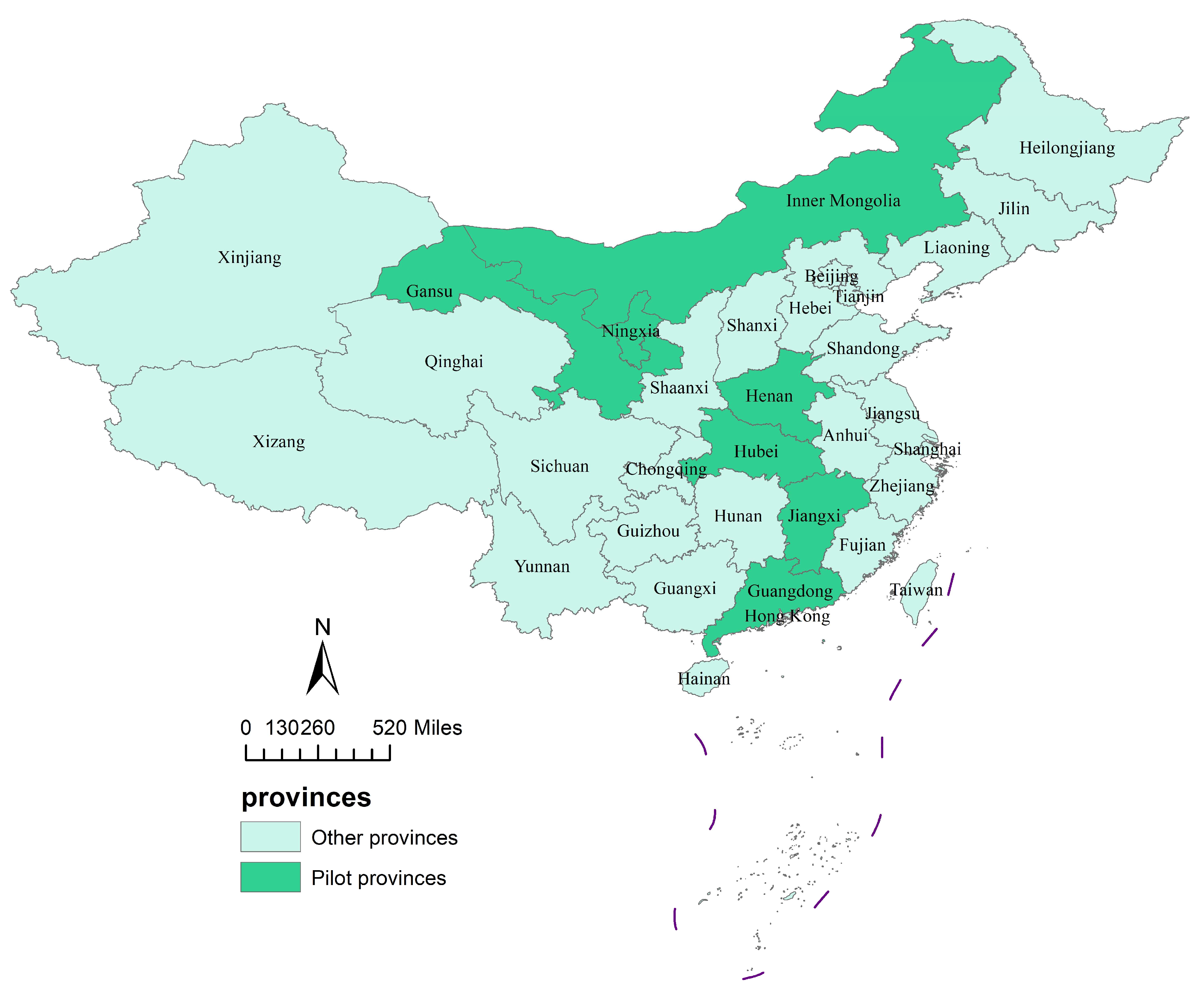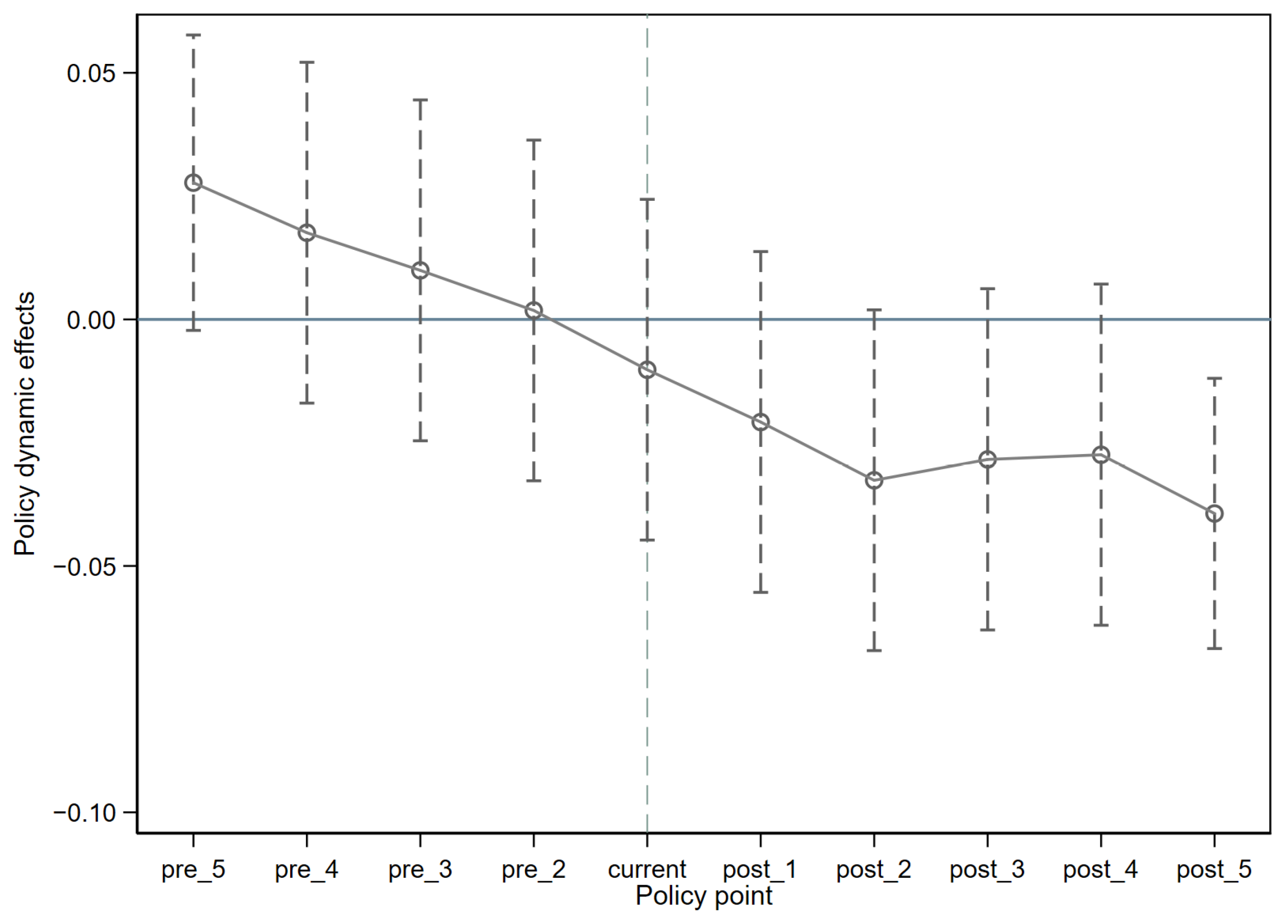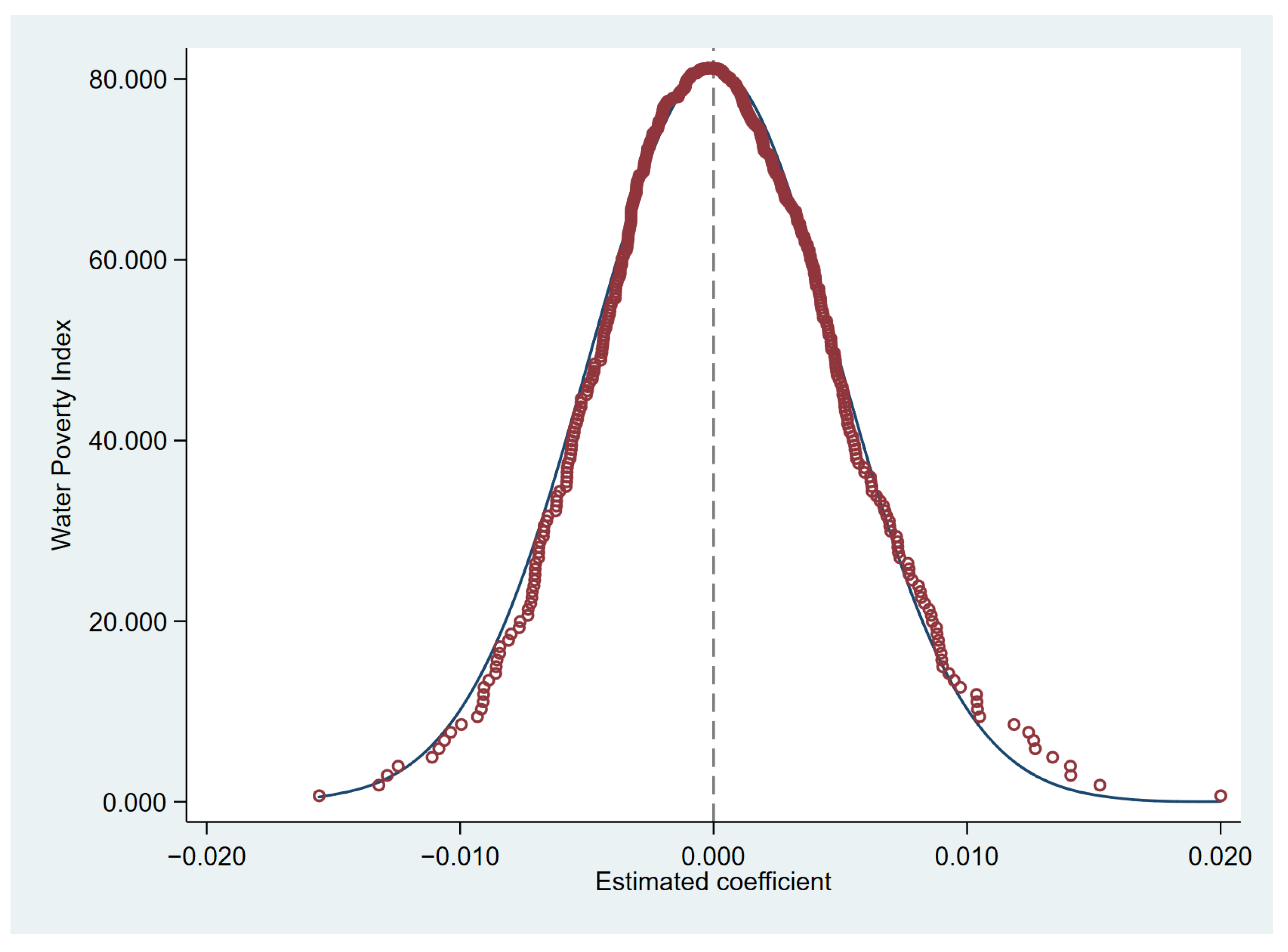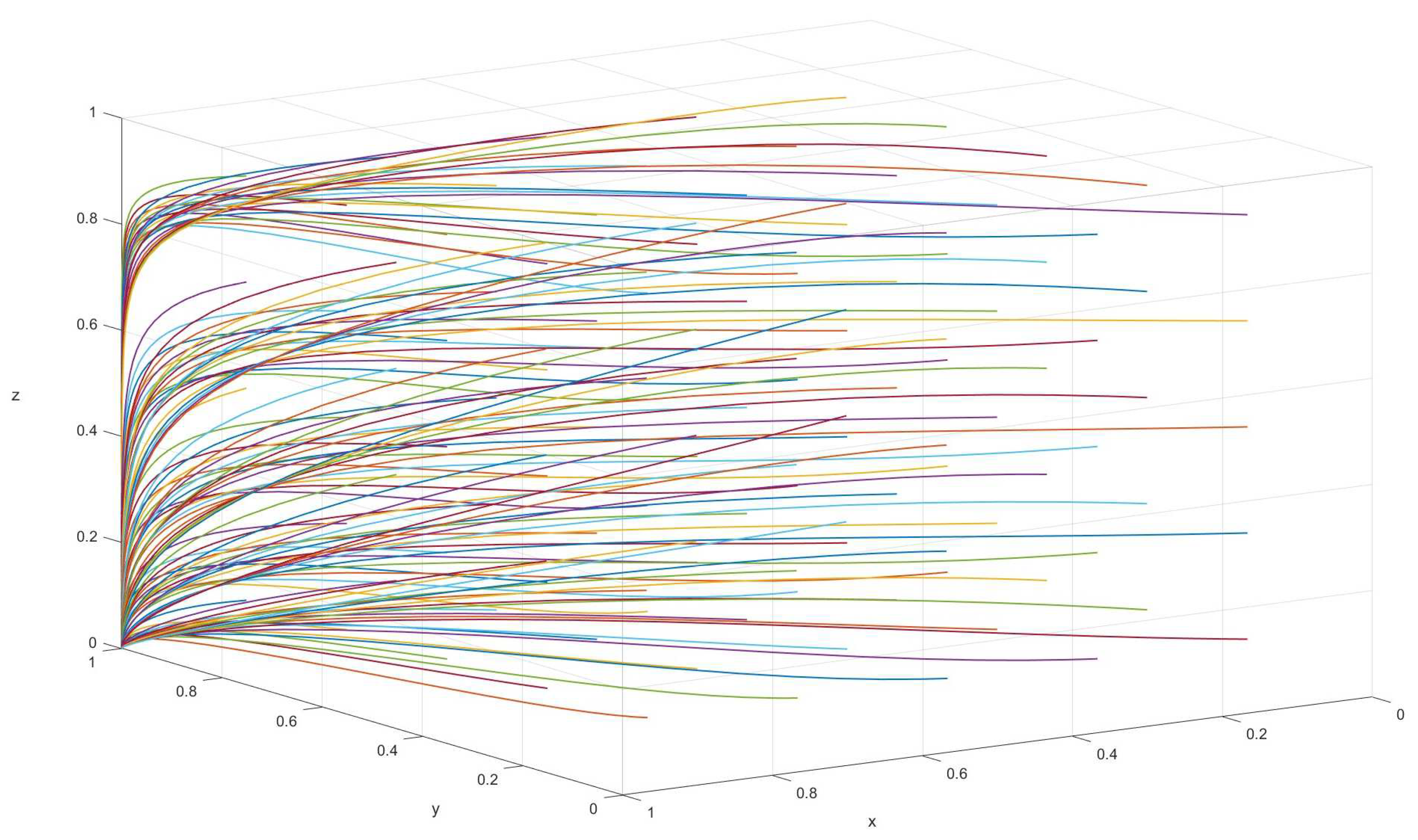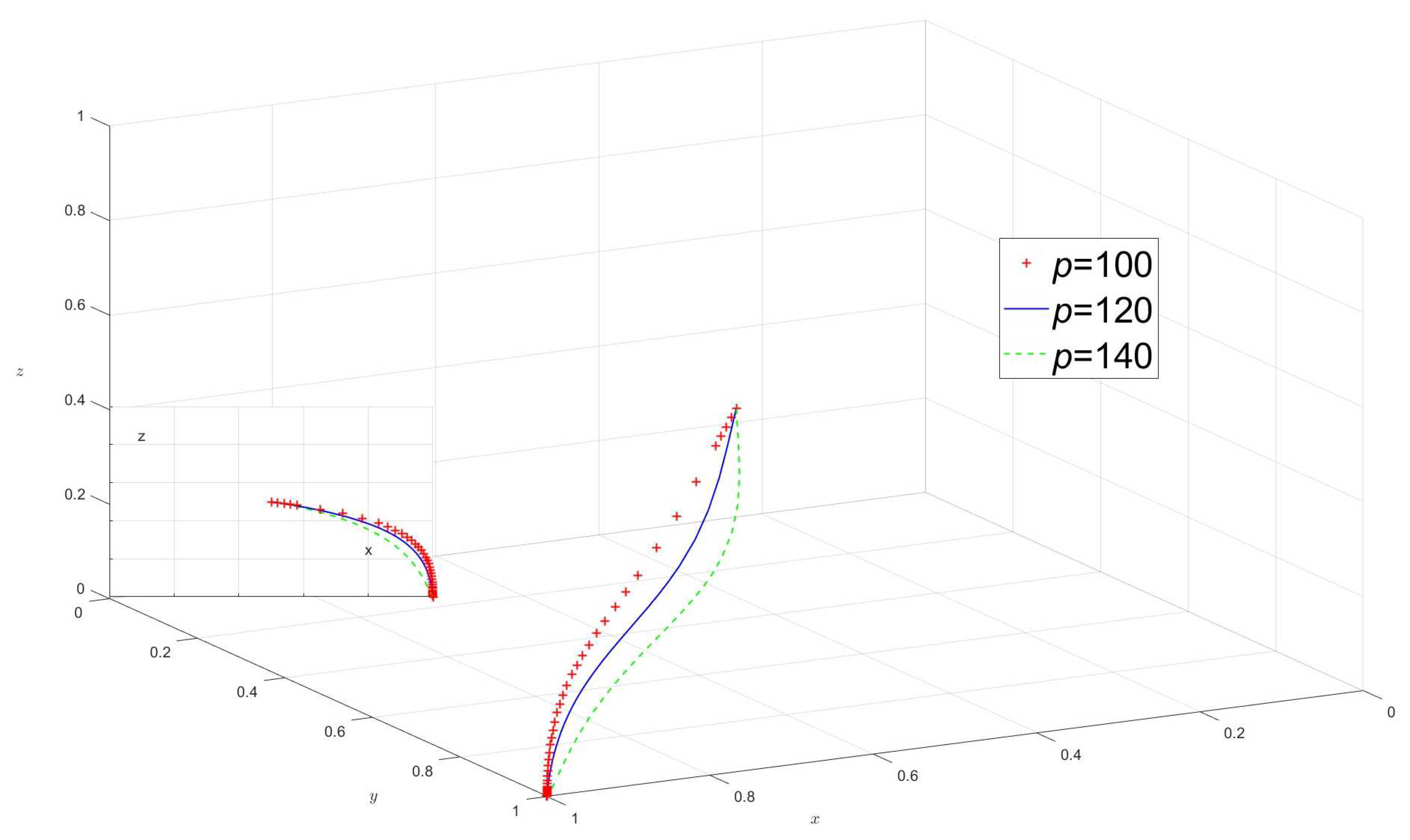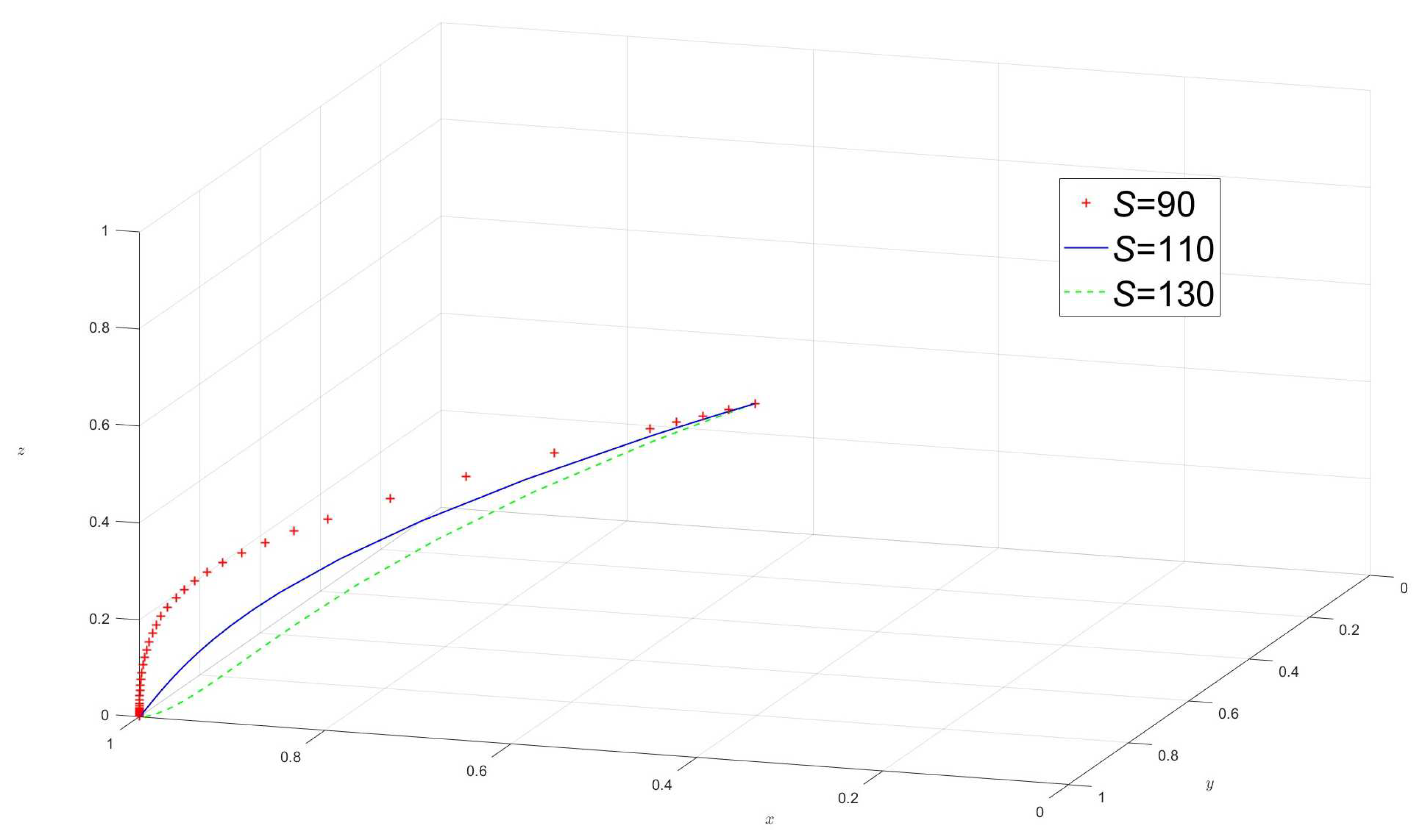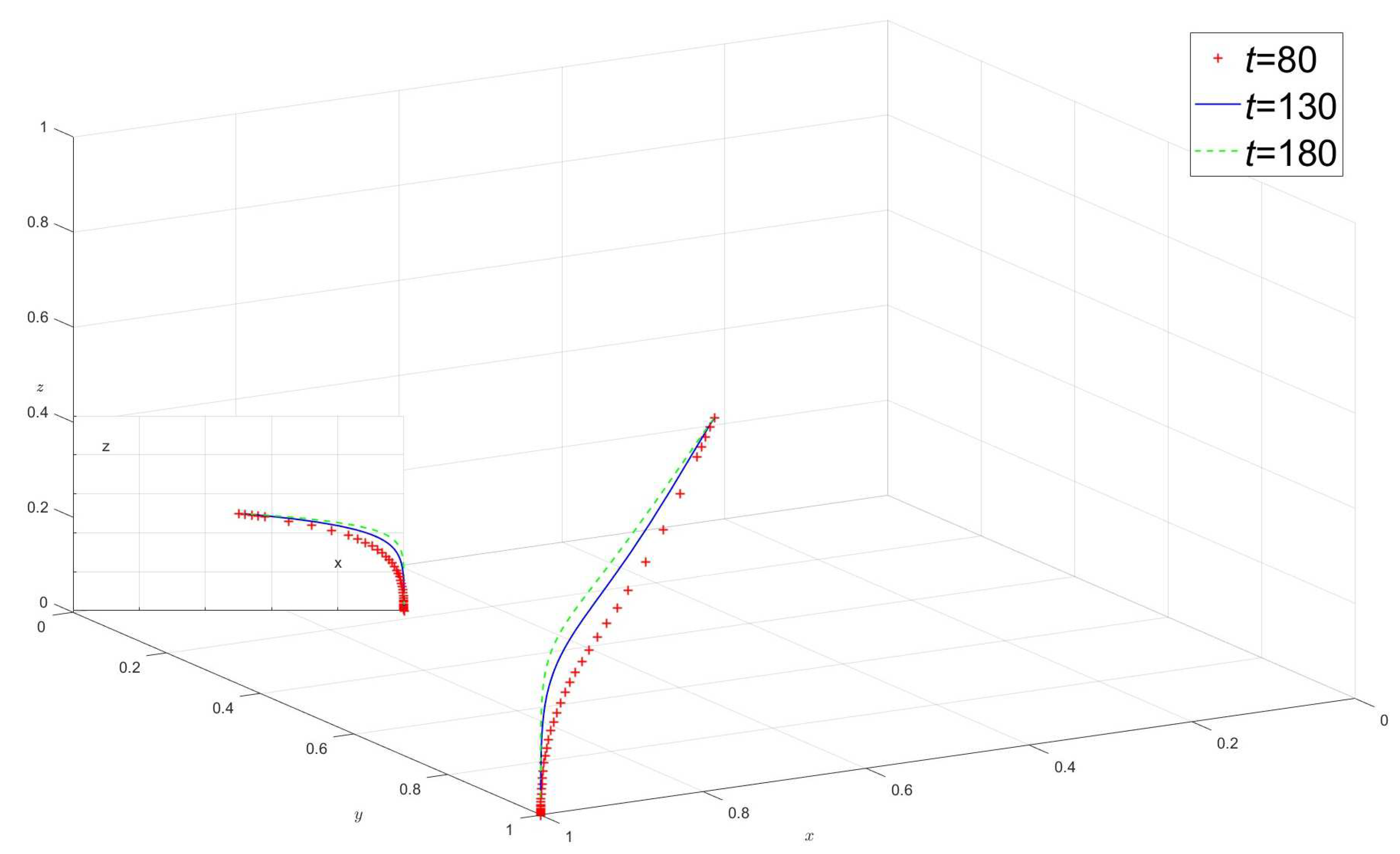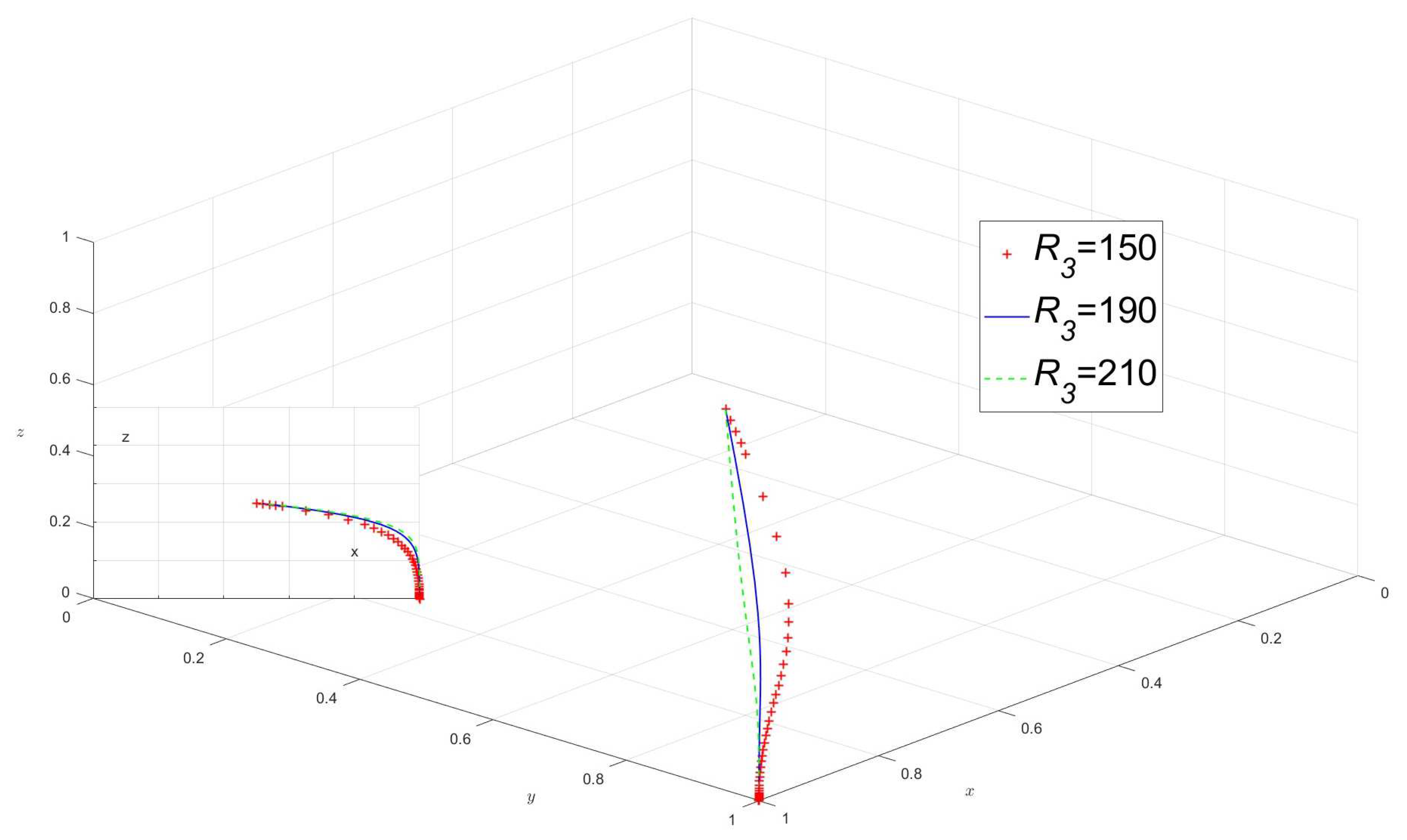Abstract
The year 2023 will mark the tenth year of China’s pilot water rights program, with China’s overall water use efficiency improving and the water-related industry continuing to grow. Due to the uneven spatial and temporal distribution of water resources in China, there still exists the real problem of resource-type water shortage and structural water shortage, in which the problem of water poverty is particularly prominent. In order to alleviate water poverty, this paper constructs a water poverty indicator system and measures it, uses a double difference model to study whether the water trading policy is effective in alleviating water poverty, and establishes a tripartite evolutionary game model to simulate the behavioral strategies of the relevant stakeholders in water trading. The main findings of this study are as follows: (1) the degree of water poverty in China’s 31 provinces and municipalities from 2008 to 2022 shows a decreasing trend in general, but there are still regional differences; (2) the pilot policy of water rights trading effectively alleviates the situation of water poverty in China, and the alleviation effect is especially obvious for the western region; (3) The degree of government subsidy, the price of water rights trading, the degree of government punishment for non-trading behavior, and the extra income gained from water rights trading all affect the degree of water poverty of both parties to the water rights trading. Therefore, we should continue to improve the water rights trading platform, promote the construction of a diversified water use market, and strengthen the monitoring, measurement and supervision of water rights trading.
1. Introduction
In 2014, in order to make more effective use of the central role of the market mechanism in the allocation of water resources, the Ministry of Water Resources formally promulgated the Interim Measures for the Administration of Water Rights Trading, and selected seven representative provinces (autonomous regions), namely, Ningxia, Jiangxi, Hubei, Inner Mongolia, Henan, Gansu, and Guangdong, as the pilot areas to launch a series of pilot projects for the determination of water rights and trading [1]. The year 2023 marks the tenth year of China’s water rights pilot work, and water rights trading has achieved remarkable results in optimizing water resource allocation, improving water resources utilization efficiency, raising awareness of water conservation, improving the market mechanism and promoting economic and social benefits. Among other things, it has optimized the registration of the right to use water resources, the flow of water rights trading and the construction of related systems. Data from China’s National Bureau of Statistics (NBS) show that compared with 2014, China’s water consumption for 10,000 yuan of gross domestic product (GDP) fell by 41.7 percent in 2023, water consumption for 10,000 yuan of industrial value added fell by 55.1 percent, and the coefficient of effective use of irrigation water in agriculture also increased by 0.046. However, the phenomenon of water poverty in China is still relatively serious, and the problems of rough water use, water pollution, and water wastage still exist, which has led to an increasingly severe supply of water resources, aggravated water shortage, and gradually attracted attention from all parties to the problem of water poverty [2]. According to the seventh population census, the rural population of China accounts for 36.11 percent of the national population. At the same time, agriculture is the largest user of water in China, with 378.13 billion cubic meters of water resources used in agriculture, accounting for 63% of the total water consumption. It can be seen that most of China’s water resources are used to supply agricultural production, while the per capita income of farmers is still low, and the output value of water-related industries is also low. Therefore, the contradiction between the supply and demand of water resources in China has been aggravated, and the problem of water poverty has become increasingly serious.
Rational allocation and efficient use of water resources are of vital importance to promote sustainable and healthy socio-economic development and safeguard people’s basic living needs. In this context, water rights trading, as an effective way of water resource allocation, has gradually received extensive attention and research from all walks of life [2].
In 2014, the Ministry of Water Resources, in selecting the pilot areas, took into account the representativeness of the geographical and water resources conditions, the enthusiasm of the local government for water resources management, the solidity of the relevant water resources management foundation, and the workload of the pilot project, etc., and chose seven areas to carry out the pilot water rights trading policy, such as Hubei, Guangdong, etc., and through the implementation of the water trading, it has facilitated the rational allocation and use of the water resources of these areas. Through the implementation of water rights trading, the rational utilization of water resources in these regions has been promoted, which once again demonstrates that the implementation of the water rights trading policy and the establishment of a water rights trading system can effectively promote the rational allocation of water resources and improve the efficiency of water resources utilization. This reflects the fact that the implementation of a water rights trading policy and the establishment of a water rights trading system can effectively promote the rational allocation of water resources and improve the efficiency of water resources utilization, thereby alleviating water poverty.
International research on water rights trading was carried out relatively early. The United States is the first country in the world to establish a water resources system. The laws and regulations related to water rights in the United States are relatively perfect, and its water rights system matches its market economic conditions [3]. Chile was one of the earliest developing countries to implement water rights trading and water resources market reform, and the Water Code enacted by Chile in 1981 has been widely verified in practice and has shown remarkable results in promoting the Pareto efficiency of water resource allocation [4]. Chile’s water rights trading is carried out under the principle of marketization, and the government has continuously promoted the development of Chile’s water rights trading market through the water rights trading system, paying more attention to fairness in the allocation of water rights and perfecting Chile’s water rights trading system [5]. Australia’s practice in the field of water rights trading has provided strong support for the innovation of agricultural irrigation technology. Since the implementation of the water rights trading system, the country’s agricultural sector has witnessed significant irrigation technology improvements [6].
When exploring the impact of water rights trading on related industries in depth, it is easy to find that this mechanism has brought significant benefits to related industries, thus strongly proving the necessity of its existence. Houston (1986), Joel (1989) and others pointed out that carrying out water rights trading can improve the efficiency of water resource allocation and economic returns to a certain extent by analyzing real-life cases [7,8]. Trading is a feasible way to solve the problem of agricultural drainage [9]. In addition, some scholars focus on market failure [10] and water rights market rules [11], which are considered to be weak links in the water rights trading market. The implementation of water rights trading also inevitably brings a series of problems, such as exacerbating the imbalance between groundwater and surface water at the demand level [12], the unfairness of water rights trading [13] and the loss of efficiency [14], such as the huge loss of economic benefits. Domestic research on water rights trading started late compared to the international field, which led to the early stage of the research scholars’ main work focused on absorbing and learning from foreign mature experiences and theories, mainly focusing on the limitations of water rights trading and its impact on the economy and society [15] and the institutional basis of water rights and its nature [16]. Some scholars have used shadow-finding and tracing techniques and whale optimization algorithms to calculate the initial water rights allocation ratio [17,18]; Du Lijuan et al. (2021) put forward a “five-step method” for confirming rights, which provides ideas for confirming irrigation water rights of farmers [19]. In addition, domestic scholars, in the establishment of regulatory mechanisms of the water rights market, have also carried out research, such as through the establishment of “two levels and three types” of water rights markets [20], a “water bank” [21] and other ways to regulate, in addition to the establishment of a comprehensive flowback. In addition, the price of water rights can be regulated by establishing a water rights pricing model with integrated return flow factors [22] and introducing real options in the water rights trading market [23].
With the development of society, although the issue of water poverty has been raised for many years, the connotation of water poverty is still controversial among different scholars. With the depth of scholars’ research, the connotation of water poverty has been enriched [24,25,26,27,28,29]. In the study of water poverty measurement methods, based on the hydrological water stress number proposed by Falkenmark (1989) to measure the degree of water scarcity [30], scholars continue to improve the water poverty measurement method and perfect the water poverty measurement system [31,32,33,34,35,36,37,38]. This paper discusses the economic and social water poverty and the water poverty index as a measure.
Through combing the literature, we found that, first, in the existing research on water rights trading policy, more literature focuses on analyzing the water rights trading model, the impact of water rights trading on water use efficiency, and trading price. At the same time, most of the existing research focuses on theoretical analysis, mainly exploring the target requirements of the water rights trading policy and summarizing the water rights model through case studies, which lays the preliminary foundation for the research on water rights trading. And the existing literature pays less attention to the relationship between water rights trading policy and water poverty. Secondly, in the research on the impact factors of water poverty, the existing literature on water poverty mainly focuses on improving the evaluation system of the water poverty index and the use of the index to measure the level of water poverty in different regions, and very few people apply the value of water poverty to the econometric model. Thirdly, in the research on water rights trading and water poverty, the existing research methods mainly focus on the method of empirical analysis and the analysis of the strategies of the main bodies of water rights trading through game theory [39,40], but few people use the evolutionary model to analyze the relationship between water rights trading and water poverty.
To sum up, this paper constructs a water poverty indicator system and adopts the double-difference method (DID) to effectively assess the ‘net effect’ of the water trading policy on water poverty and explores whether the water trading policy can alleviate the problem of water poverty in order to make up for the shortcomings of the existing relevant studies. In addition, this paper also establishes a three-party evolutionary game model to simulate the behavioral strategies of water rights trading-related stakeholders, which provides references for further alleviating water poverty.
2. Theoretical Foundations and Research Hypotheses
Water rights trading refers to the introduction of market mechanisms in the process of water resource allocation, trading water as a commodity, and applying the law of value to water resource allocation. According to the different types of rights, water rights trading can be divided into four types: regional water rights trading, water abstraction rights trading, irrigation water users water rights trading and public water supply network users water rights trading. Regional water rights refer to the boundary of the region’s water rights in the basin, which is the specific water availability in the basin’s water allocation; water abstraction rights are the rights explicitly stipulated in the water abstraction permits issued by the water abstraction users under the premise of strictly controlled water availability; irrigation user water rights refer to the water rights of irrigation users in the irrigation area based on the water rights ownership certificates issued by the local people’s government or the authorized water administrative department or water use indexes, etc.; public water supply pipeline network users’ water use rights concerns the amount of water available for use by major water users within the public water supply pipeline network.
The pilot water rights trading policy covers three main areas, namely, water rights determination, water rights trading and water rights system construction. Water rights trading is the simultaneous use of the State and the market to encourage the transfer of water resources from areas of high input–output to areas of low input–output [41,42]. Therefore, water rights trading can bring additional benefits to enterprises with more water rights and provide channels for enterprises with fewer water rights to obtain additional water rights, thus incentivizing enterprises to improve the efficiency of water use in their daily production activities, thereby reducing the degree of water poverty and alleviating the status quo of water scarcity. Based on the above analysis, the hypothesis is formulated:
H1.
Water trading policies can alleviate water poverty.
The extent of water poverty varies more markedly from region to region in China. The problem of water poverty in the western region is more serious and complex than in the eastern, central and north-eastern regions, and this is especially true for the five north-western provinces, including Shaanxi, Gansu, Ningxia Hui Autonomous Region, Qinghai and Xinjiang Uygur Autonomous Region. Specifically, firstly, the Northwest region is facing a more serious resource-based water shortage; secondly, due to the Northwest region’s low annual precipitation and resource-based water shortage problem of agricultural production irrigation methods leading to agricultural water consumption, water use efficiency is low. The western region has rapid economic development, but due to the irrational water use structure and low water use efficiency, the existing water resources cannot meet the growing demand for industrial water use. Therefore, this paper puts forward the hypothesis:
H2.
The mitigating effects of water trading policies on water poverty are more pronounced in the western region.
3. Construction and Measurement of Water Poverty Indicator System
This section may be divided by subheadings. It should provide a concise and precise description of the experimental results, their interpretation, as well as the experimental conclusions that can be drawn.
In selecting specific indicators, this paper strictly follows the basic principles of science, systematics and data availability to ensure the objectivity and reliability of the assessment results. The main factors affecting the water poverty situation include five dimensions: water resources endowment, water supply facilities, water resources utilization capacity, water resources usage, and ecological environment. Therefore, this paper will take these five dimensions as the first-level indicators and select 18 s-level indicators to construct a water poverty indicator system to measure the water poverty situation in 31 provinces, cities, autonomous regions and municipalities directly under the central government, and calculate the specific water poverty value between 2008 and 2022 using an entropy weighting method. The water poverty evaluation indicator system is shown in Table 1.

Table 1.
Water poverty indicator system.
In this paper, we adopt the method of polarity standardization to process the indicator data. Firstly, it is necessary to determine the indicator nature of the 18 indicators. In this paper, except for the proportion of agricultural water use, the water use of CNY 10,000 GDP, total industrial water use, urban per capita living water use and agricultural fertilizer application discounted amount are negative indicators, and the rest are positive indicators. The water poverty index constructed in this study is a negative indicator, i.e., the larger the value of this indicator, the more serious the water poverty situation in the region. For this reason, it is necessary to uniformly adjust the positive and negative orientations in the secondary indicators so that all indicators show consistent positive or negative correlations with the water poverty index. Specifically, for positive indicators whose larger values imply better water resource conditions, they need to be negatively orientated; for negative indicators whose larger values imply worse water resource conditions, they need to be positively orientated. To provide the necessary data basis for the subsequent integrated assessment. The standardization is as follows:
The objective assignment method can objectively respond to the importance of each indicator in the comprehensive evaluation system and is not affected by human subjective factors; therefore, this paper adopts the entropy weight method to determine weights.
(1) Calculate the characteristic weight of the ith evaluated object under the jth indicator
(2) Calculate the entropy value of the jth indicator as
(3) Determination of weights
Analyzing the calculated water poverty values from the time dimension reveals that the development trend of water poverty can be divided into three main categories. Liaoning and Shaanxi show a fluctuating upward trend in the water poverty index between 2008 and 2022; 15 provinces and cities, including Tianjin, Zhejiang and Anhui, show an overall downward trend in the degree of water poverty; and 13 regions, including Beijing, Shanghai, Chongqing and Jiangsu, show an overall stable trend in the water poverty index over the 15-year period.
4. Analysis of the Effectiveness of Water Rights Trading Policies in Alleviating Water Poverty
4.1. Data Sources and Selection of Variables
The data in this paper were obtained from the website of the National Bureau of Statistics of China (NBS), China Environmental Statistics Yearbook (2008–2022), China Statistical Yearbook (2008–2022) and China Water Statistics Yearbook (2008–2022).
The explanatory variable of this paper is the degree of water poverty, which is represented by the Water Poverty Index (WPI). The core explanatory scalar of this paper is the water rights trading pilot policy dummy variable. This paper also controls for other factors affecting the degree of water poverty, including the level of financial support, the level of technology and the share of agriculture. The level of technology is represented by the intensity of R&D investment; the strength of financial support is the ratio of local financial expenditure on agriculture, forestry and water affairs to GDP; and the share of primary industry output is used to represent the industrial structure. Specific information about each variable is shown in Table 2.

Table 2.
Introduction of variables.
In this paper, 31 provinces (municipalities and districts) in China were selected as the research object, with the time span of 2008–2022. In 2014, the Ministry of Water Resources carried out a pilot policy of water rights trading in seven provinces, including Hubei, Guangdong, Ningxia, Inner Mongolia, Gansu, Jiangxi, and Henan. The regional distribution of policy implementation is shown in Figure 1. Therefore, this paper divides China’s 31 provinces (municipalities and districts) into an experimental group and a control group based on whether or not they have carried out a pilot water rights trading policy, in which the experimental group of regions has carried out a pilot water rights trading policy and the control group has not carried out a pilot water rights trading policy.
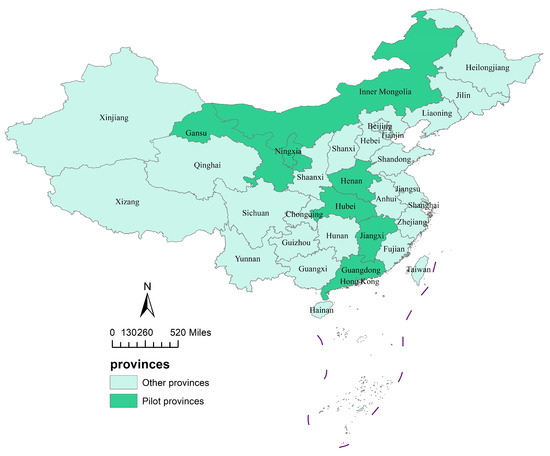
Figure 1.
Map of water trading pilot policies.
4.2. Modeling
When a policy has been implemented for a period of time, the implementation effect of the policy is often concerned, and the double difference model is often applied in the field of evaluating the effect of the policy, and it can effectively solve the endogeneity problem. Therefore, this paper adopts the double difference model (DID) to study the impact of the water rights trading policy on water poverty status, and the model is set as follows:
where i is the provinces (cities and districts) in China, and t is the year. is the explanatory variable of this paper’s water poverty index, which indicates the value of the water poverty index of the ith province (city, district) in China in year t. is the core explanatory variable of this paper, which is the interaction term of grouping dummy variables and policy dummy variables. If the region is a pilot region for water trading, then treat = 1, if the region is not a pilot region for water trading, then treat = 0. China has formally launched the pilot work of water trading since 2014, so let post = 0 before 2014, and post = 1 in 2014 and later. Meanwhile, in order to prevent other factors from influencing the explanatory variables in this paper, this paper introduces some of the control variables into the model, i.e., . Individual fixed effects are denoted by , time-fixed effects are denoted by , and represents the random error term. In the double difference model of this paper, if the coefficient of is less than 0, then it represents that carrying out the pilot water trading policy can effectively reduce the water poverty index of the region compared to not carrying out the pilot water trading policy. Table 3 shows the results of descriptive statistical analysis of the variables in the model.

Table 3.
Results of descriptive statistical analyses of variables.
4.3. Analysis of Regression Results
In this paper, a double difference model (DID) was used to analyze the implementation effect of the water trading policy, i.e., whether the water trading policy affects the water poverty level, and the main findings of the model are shown in Table 4. Model 1 contains only the net effect of the core explanatory variable policy, and the coefficient of DID is −0.044, which is significant at the 1% confidence interval, i.e., the pilot water rights trading policy has a significant inhibitory effect on the degree of water poverty. Compared to Model 1, Model 2 introduces all control variables, and the coefficient of DID is −0.045 and significantly negative at the 1% confidence interval, which represents that the water rights trading policy can effectively alleviate the degree of water poverty. Only one of the control variables in model 2, technology level, is significant at the 1% confidence interval. The level of technology is represented by the intensity of the R&D investment, and its regression coefficient in the model is 0.012. i.e., for every unit increase in the level of technology, the water poverty index (WPI) will increase by 0.012 units. There is a significant positive effect of the technology level on WPI, and the increase in technology level will improve the efficiency of water resources utilization and at the same time will increase the local water poverty level due to the increase in industrial pollution and industrial water use.

Table 4.
Benchmark regression analysis results.
4.4. Parallel Trend Test
The parallel trend test is a prerequisite for the double difference method to analyze the effectiveness of the policy, i.e., the experimental group and the control group should have a common trend in the context before the implementation of the policy and not be differentiated over time. Therefore, in this paper, by taking 2013, the year before the implementation of the pilot water rights trading policy, as the base period, we carry out baseline regression analyses on the interaction terms pre_2, pre_3, pre_4, and pre_5 of the policy dummy variable treatment and the grouping dummy variable before the implementation of the policy and prove that there is no significant difference when they are not subjected to the policy shocks if the regression coefficients of the interaction terms are not significant. The structure of the parallel trend test is shown in Figure 2. The confidence interval of the regression coefficients of pre_2, pre_3, pre_4, pre_5 before the policy occurs is 0, that is, the regression coefficient is not significant. The parallel trend test indicates that there is no significant difference between the experimental group and the control group before the implementation of the water rights trading pilot policy, which is in line with the parallel trend assumption. After the implementation of the pilot water trading policy, the interaction term regression coefficient gradually changes from positive to negative, with an overall decreasing trend, indicating that the alleviation of water poverty by the pilot water trading policy gradually strengthens over time; the significance of the regression coefficients is significant in the four periods after the implementation of the policy, indicating a certain lag in the impact of the policy.
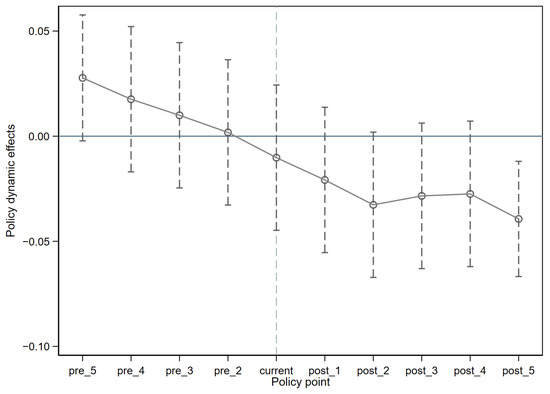
Figure 2.
Parallel trend test results.
4.5. Placebo Testing
In order to prevent other possible policy and random factors that may exist during the implementation of the pilot water trading policy from influencing the research results, the authors conducted a placebo test by randomly sampling the interaction term 500 times and determining whether it passed the placebo test or not by looking at the estimated values of the spurious regression coefficients. The results of the regression coefficient plotting are shown in Figure 3. By observing the coefficient mean plots, it can be found that the estimates of the spurious regression coefficients are around the zero point and obey the normal distribution, and all the estimates of the spurious regression coefficients are larger than the actual regression coefficient estimate of −0.045. This means that the double-difference model in this paper passes the placebo test and that the changes in the level of water poverty are due to the implementation of the pilot policy of water trading rather than other exogenous factors.
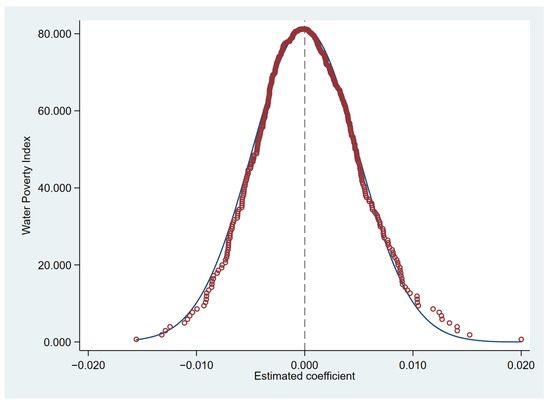
Figure 3.
Plot of mean values of placebo test coefficients.
4.6. Heterogeneity Analysis
There are more obvious differences in the degree of water poverty among regions in China, so the effect of water rights trading on water poverty may vary from region to region. In this paper, 31 provinces are divided into four regions according to geographical location: east, central, west and northeast for the heterogeneity test, and the differences in their inhibiting effects on water poverty are compared and analyzed. Since the three provinces of Liaoning, Jilin and Heilongjiang in the Northeast have not implemented the pilot policy of water rights trading, the heterogeneity test in this paper only analyses the eastern, western and central regions. The results of the heterogeneity analysis are shown in Table 5.

Table 5.
Heterogeneity analysis of the impact of water rights trading policies on water poverty.
The results show that the impact of the water trading policy on water poverty in the central region is not significant; that is, the implementation of the water trading policy did not alleviate the water poverty phenomenon in the central region. The impact of the water trading policy on water poverty in the eastern region and the western region is significantly negative at the 99% confidence interval, in which the absolute value of the regression coefficients of the interaction terms of the policy in the western region are greater than the absolute value of the regression coefficients in the eastern region. This means that the water rights trading policy reduces water poverty in the western region more significantly, and the water rights trading policy reduces water poverty in the western provinces and municipalities by about 5.7%. The main reason may be that, compared with the eastern and central regions, the water poverty in the western region is more serious, and there are problems of high industrial water demand and low water use efficiency in the western region, so the water trading policy in the western region has a more obvious effect on the alleviation of water poverty.
5. Simulation of Water Rights Trading Behavior in the Context of Water Poverty
Through the analysis of the double difference model in the previous section, it can be concluded that the water rights trading policy can alleviate the status quo of water poverty. However, how the water rights trading policy alleviates the phenomenon of water poverty needs further research. Therefore, in order to further study the specific path of the water rights trading policy affecting water poverty, this paper constructs a three-party evolutionary game model between the government, buyers and sellers of water rights trading in order to draw conclusions.
5.1. Construction of a Three-Party Evolutionary Game Model for Water Rights Trading
5.1.1. Game Subject Setting
The main parties involved in water rights trading are government departments, water rights trading buyers and water rights trading sellers. Depending on the degree of water poverty in the region, the government will provide strong subsidies or weak subsidies to buyers and sellers of water rights trading, and the two are in a subsidy–subsidized relationship. Buyers and sellers of water rights will choose to trade or not to trade according to their own needs. The buyer of water rights can realize their own standard of water use by purchasing water rights, thus stimulating the buyer’s enterprise to improve the efficiency of water use; the seller of water rights can obtain funds by selling water rights, thus improving the economic efficiency of the enterprise.
5.1.2. Game Parameter Setting
Since the water rights trading process will involve the interests of the three main parties, it is necessary to set the parameters in the game model, as shown in Table 6.

Table 6.
Parameter settings and their meanings.
5.1.3. Game Hypothesis
Hypothesis 3.
Participating subjects. The three-party evolution model consists of three subjects: ‘water rights trading buyer’, ‘water rights trading seller’ and ‘government’, and all three parties are finitely rational. The model involves the government’s game decision {strong subsidy, weak subsidy}, the buyer’s game decision {trade, no trade}, and the seller’s game decision {trade, no trade}. The probability that the government grants a strong subsidy is x, and the probability that it grants a weak subsidy is 1 − x; the probability that the buyer trades is y, and the probability that it does not trade is 1 − y; and the probability that the seller trades is z, and the probability that it does not trade is 1 − z. The ranges of x, y, and z are all [0, 1]. A transaction can only be completed if both buyer and seller choose to trade water rights.
Hypothesis 4.
Government subsidies. The government will provide strong or weak subsidies to buyers and sellers who choose to trade water rights, depending on whether water poverty exists and whether they choose to trade water rights, providing strong subsidies to the party with stronger water poverty and weak subsidies to the party with weaker water poverty. In the strategic choice of strong subsidies given by the government, the subsidy that would be given to the buyer or seller who chooses to trade in water rights is . Weak subsidies provided by the government are mainly given to the buyer or seller in the form of verbal propaganda, etc., and thus do not generate substantial benefits for both parties to the water rights trade.
Hypothesis 5.
Benefits assumption. The buyer or seller of the water rights transaction will have a series of time costs, transaction costs and other costs because of choosing to carry out the water rights transaction, which is recorded as . In the case that the water rights transaction market develops continuously and tends to be stable, the price of the water rights transaction will be determined by the market, and this paper assumes that the price of the water rights transaction is . The benefits bought by the buyer, and the seller of the water rights held prior to the water rights transaction are recorded as and , respectively; while the buyer’s purchase of the water rights will bring them an additional benefit of .
Hypothesis 6.
Government gains. The government will penalize the buyer or seller who chooses not to trade in water rights, and the government will gain a . In addition, the strong subsidy given by the government to the buyer or seller who chooses to trade in water rights in accordance with the regulations will bring the government a reputational gain A. The government will also gain from the subsidy.
The payment matrix is constructed according to the game assumptions, as shown in Table 7.

Table 7.
Government, buyer, and seller tripartite game payment matrix.
5.1.4. Dynamic Equations for Buyer Replication
Based on the payment matrix in Table 7, let the expected and average returns of the buyer adopting the trading and no-trading strategies be , and , respectively, which are expressed as follows:
The replication dynamic equation for buyer strategy selection is:
The first-order derivative of x is:
According to the buyer’s replicated dynamic equation, the seller chooses to trade under the condition that the strategy is stable: and . Let , and be an increasing function with respect to since . When , , is constant 0, can take any value, and the buyer can not determine the stabilizing strategy. When , , when , and when . Therefore, is an evolutionary stabilizing strategy, and when the probability of the government providing a strong subsidy is bigger and y is bigger, the probability of is bigger and the strategic choices of the buyer and the seller will converge to the one where both of them choose to carry out a water rights transaction.
5.1.5. Dynamic Equations for Seller Replication
Based on the payment matrix in Table 7, let the expected and average returns of the seller adopting the trading and no-trading strategies be , , and , respectively, expressed as follows:
The replication dynamic equation for seller strategy selection is:
The first-order derivative of y is:
According to the seller’s replication dynamic equation, the seller chooses the strong willingness to be slightly stable, conditional on: and . Let , since , is an increasing function on z. When and , is constant at 0, and the seller is unable to determine a stabilizing strategy. When and , at , and at . Therefore, is the evolutionary stable strategy.
5.1.6. Government Replication of Dynamic Equations
Based on the payment matrix in Table 7, the expected return and average return of making the government adopt the strong subsidy and weak subsidy strategies are , and , respectively, which are expressed as follows:
The replication dynamic equation for government strategy choice is:
The first-order derivative of z is:
According to the government’s replication dynamic equation, the condition for the government to choose a strong willingness to be slightly stable is: and . Let , and since , is a decreasing function with respect to . The government’s choice of a strong willingness to choose is a function of . Also, since both and are between 0 and 1, is constantly less than 0. The only evolutionarily stable strategy is if if .
5.2. Analysis of the Stability of Water Rights Trading in the Context of Water Poverty
The Jacobi matrix for the three-way evolutionary game is
where , , , , , , , , .
Let , , , respectively, the equilibrium points of the game can be obtained, and there are 13 equilibrium points of the three-party evolutionary game in this paper, which are (0,0,0), (1,0,0), (0,1,0), (0,0,1), (1,1,0), (1,0,1), (0,1,1), (1,1,1), (−1,1,), (1,−1,), (,,1), (,,0), (0,0,). Lyapunov’s first method of determining stability states that the equilibrium point is asymptotically stable when all the eigenvalues of the Jacobi matrices are negative, the equilibrium point is unstable when at least one of the eigenvalues is positive, and the equilibrium point is asymptotically stable when the eigenvalues of all the Jacobi matrices are negative. The stability of the equilibrium point cannot be determined from the positive and negative eigenvalues. From Table 8, only the equilibrium point is ESS.

Table 8.
Equilibrium point stability analysis.
5.3. Simulation Analysis
Now, in order to verify the validity of the stability analysis results, we refer to the prices of relevant water rights trading cases published on the website of China’s Water Rights Exchange and comprehensively consider the unique water resources situation in the Gansu Province. The model is assigned and numerical simulation is carried out using Matlab2023b software, where the array 1: , , , , , .
5.3.1. Ideal State Verification
The initial value of the game is continuously changed for multiple evolutionary games, and the initial evolutionary path diagram is shown in Figure 4. The evolution results show that different initial values will have an effect on the system’s evolution rate and have no effect on the state of system convergence. All of the three main parties gradually converge in the evolution to the point (1,1,0), i.e., the equilibrium point derived from the theoretical analysis, which indicates that the numerical simulation and the theoretical analysis are consistent and verify the correctness of the theoretical analysis.
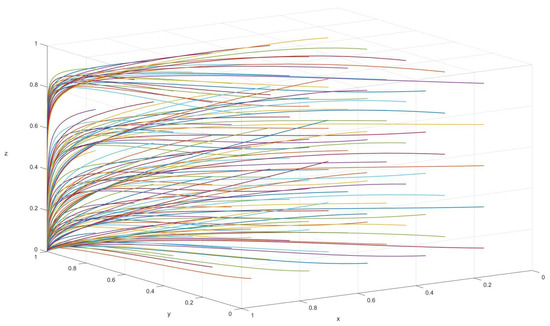
Figure 4.
Diagram of the initial evolutionary path of the tripartite subject.
5.3.2. Impact of Parameter Variations on Evolutionary Outcomes
Set the initial values of the game , and to 0.5. Analyze the effects of , , and on the evolutionary game process and its outcome on the basis of array 1 under the conditions that > > 0, > > 0, .
In order to investigate the influence of on the three-party evolutionary game process and the final result, this paper assigns to three different values of 100, 120 and 140, respectively, and carries out 150 evolutions of the replicated dynamic equations, and the simulation is plotted in Figure 5. During the evolution of the system to the stable point, the increase in the water rights trading price will accelerate the increase in the seller’s willingness to choose to trade, and with the continuous increase in the water rights trading price, the seller’s gain because of the water rights trading will be increased accordingly, so the probability that the seller of the water rights trading chooses to carry out the water rights trade will become bigger and bigger continuously. At the same time, the probability of the government providing a strong subsidy will continue to decline. Therefore, the price of water rights trading can be appropriately increased, thus promoting the willingness of enterprises to enhance water rights trading, and thus further improving water use efficiency and alleviating water poverty.
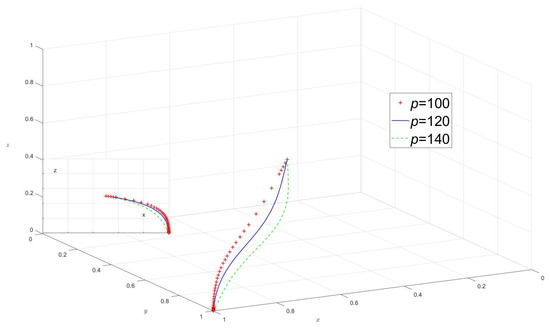
Figure 5.
The impact of water rights price changes on the strategic choices of tripartite entities.
In order to investigate the influence of on the three-party evolutionary game process and the final outcome, this paper assigns to three different values of 90, 110, and 130, respectively, and the replicated dynamic equations evolved over time for 150 simulations, and the simulation results are plotted in Figure 6. During the evolution of the system to the stability point, the raising of the strong government subsidy to sellers or buyers who choose to trade water rights accelerates the increase in the willingness of buyers and sellers to choose to trade. As S is raised, the probability of both parties choosing to trade water rights will be significantly raised, and the probability of the government providing strong subsidies will gradually decline. Therefore, the government can appropriately raise the level of subsidy so as to maintain the willingness of both parties to trade water rights at a high level and thus further improve water use efficiency and alleviate water poverty through water rights trading.
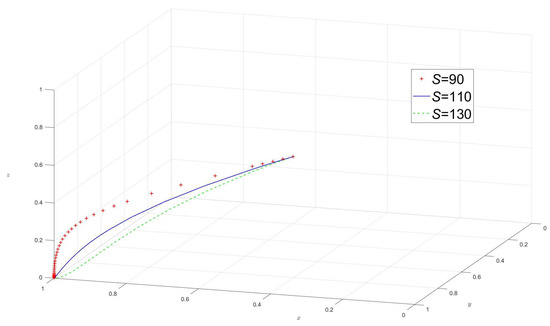
Figure 6.
The impact of strong government subsidies on the strategic choices of tripartite subjects.
In order to investigate the influence of on the three-party evolutionary game process and the final outcome, this paper assigns three different values of , namely 80, 130 and 180, and performs 150 evolutions of the replicated dynamic equations, and the simulation results are plotted in Figure 7. During the evolution of the system to the stability point, the increase in the degree of punishment from the government to the water rights trading parties who choose not to trade makes the probability of the government providing weak subsidies increase, while the probability of the water rights trading parties choosing to trade decreases. The increase in the level of punishment will make the government revenue increase slowly but reduce the incentive for water rights trading parties to trade. Therefore, the government should maintain a moderate level of penalties for non-transacting buyers or sellers of water rights so as to promote the willingness of enterprises to increase the willingness to trade in water rights, thereby further improving water use efficiency and alleviating water poverty.
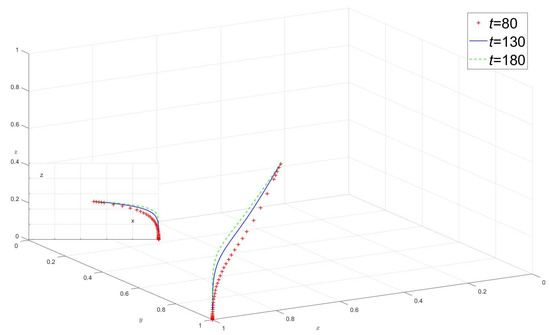
Figure 7.
The impact of strong government punishment on the strategic choices of tripartite subjects.
In order to explore the influence of on the three-party evolutionary game process and the final result, this paper assigns three different values of 150, 190 and 210, respectively, and carries out 150 evolutions of the replicated dynamic equation; the simulation results are plotted in Figure 8. In the process of system evolution to the stable point, the enhancement of the revenue gained from the purchase of water rights will increase the probability of the buyer of water rights choosing to trade and also increase the growth rate of the probability of the government choosing to weakly subsidize. Therefore, the additional benefits from purchasing water rights can be appropriately increased, thus promoting the willingness of enterprises to enhance water rights trading, which in turn further improves water use efficiency and alleviates water poverty.
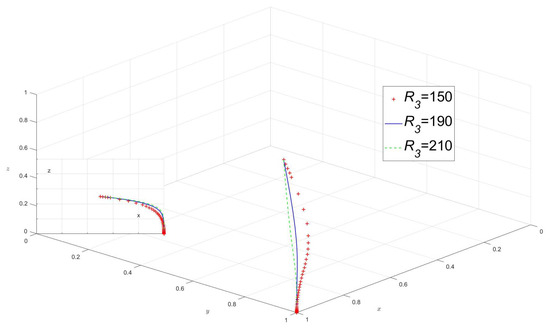
Figure 8.
The effect of the benefits obtained from the purchase of water rights on the strategic choices of tripartite subjects.
6. Research Findings and Policy Recommendations
6.1. Findings
In this paper, by constructing the water poverty index system, we used the double difference model (DID) to study the impact of a water rights policy on the degree of water poverty and tested the data for spatial heterogeneity. Finally, by constructing a tripartite evolutionary game among the government, buyers and sellers, the strategic choices and game results of the three main parties are analyzed. This study mainly draws the following conclusions: (1) the results of analyzing the time difference of water poverty show that the degree of water poverty in China’s 31 provinces and municipalities in the period of 2008–2022 generally shows a decreasing trend, but there are still regional differences; (2) compared with non-pilot areas, the pilot area’s water poverty index is significantly lower, compared to the sample mean value, which is lower by 4.5%. This reflects the effectiveness of the water trading policy and confirms that the water trading policy can effectively alleviate the phenomenon of water poverty; meanwhile, the results of the parallel trend test and the placebo test also indicate that the double-difference model in this paper is effective. This paper further investigates whether there are regional differences in the impacts of a water trading policy on water poverty, and the results of the heterogeneity test show that, compared with the eastern region and the central region, the water trading policy in the western region provides more obvious relief. (3) The degree of government subsidies, the price of water rights trading, the degree of government penalties for non-transaction behavior, and the additional revenue gained from water rights trading all affect the degree of water poverty of both parties to the water rights trading, thus affecting the outcome of the game. As the price of water rights transactions continues to increase, the seller’s exchange gain will also be increased accordingly, and the probability of a seller choosing to carry out of water rights transactions will continue to become larger. As the government subsidies increase, the probability of both parties choosing to trade water rights increases significantly, and the probability of the government providing larger subsidies will gradually decrease. The government’s choice to not trade punishes both sides of the water rights transaction and also increases the probability of the government providing weak subsidies. The increase in the government’s punishment for those who choose not to trade makes the probability of the government providing weak subsidies increase and at the same time reduces the incentive of the two parties to trade water rights. The increase in the income gained from the purchase of water rights makes the probability of water rights buyers choosing to trade continue to increase and also raises the probability of the government choosing to provide weak subsidies.
The impact of irrigation on water use is far-reaching and complex, and its use is often a dynamic process. In the case of crop rotation, for example, different crops have different water needs during their growth cycles, which leads to dynamic adjustments in irrigation volumes. Under the crop rotation model, farmers need to arrange irrigation schedules according to the type of crop currently being grown and the stage of growth to ensure efficient use of water resources. At the same time, climate change brings more uncertainty to irrigation strategies. Dry years may require increased irrigation to ensure crop survival, while years with abundant rainfall may require less irrigation to conserve water. In addition, extreme weather events such as heavy rainfall may also cause damage to the irrigation system, further affecting the efficient use of water resources. Therefore, rational irrigation strategies are not only related to crop yields but also to the sustainable use of water resources. Agricultural managers need to pay close attention to climate change and crop demand, and dynamically adjust irrigation schedules to achieve efficient water use and reduce negative impacts on the environment.
6.2. Policy Recommendations
First, we must continue to improve the water rights trading platform. We need to establish a sound national water trading statistics system, trading rules, technical standards, data specifications, etc., to accelerate the promotion and mutual recognition of water trading information resources to ensure that water trading is efficient and standardized. At the same time, each province should have policies adapted to local conditions, actively build water trading platforms with regional specificity, establish and improve the water trading regulatory systems, and explore water trading models that are suitable for its own situation so that the water trading can be more effective at alleviating the regional water poverty situation.
Secondly, the construction of a diversified water rights market should be promoted. A water rights trading policy is one of the effective ways to solve the problem of water shortages and alleviate water poverty. Therefore, China’s government should further promote diversified water rights market trading, regional water rights trading, water abstraction rights trading, and irrigation user water rights trading and constantly innovate the water rights trading measures so as to improve the efficiency of water resource use. Water demand is the premise of water rights trading; therefore, the government should open up the trading channels and encourage users to carry out water rights trading in addition to attracting experienced and capable social capital organizations to access water rights trading so as to make the water rights trading market more active. At the same time, the government should also strengthen the supervision and intervention of water rights trading to ensure the good order of the water rights trading market.
Third, we should strengthen the monitoring, measurement and supervision of water rights trading. The existence of a monitoring system for water rights trading can regulate the behavior of water rights trading and promote more water-using subjects to actively carry out water rights trading so as to achieve the purpose of alleviating water poverty. To establish a sound monitoring system for water rights trading, the first step is to strengthen the supervision of water use. The second is to strengthen the supervision of water rights trading.
Author Contributions
Conceptualization, K.Z. and Y.C.; methodology, K.Z. and Y.C.; formal analysis, Y.C.; resources, K.Z.; data curation, M.Z.; writing—original draft preparation, K.Z., Y.C., and M.Z.; writing—review and editing, K.Z., Y.C., and H.L.; visualization, H.L.; supervision, K.Z. and H.L. All authors have read and agreed to the published version of the manuscript.
Funding
This research was funded by the Youth Project of the National Social Science Foundation of China (Approval Number: 19CJY018).
Data Availability Statement
The data used in the current study are available from the corresponding author upon reasonable request.
Conflicts of Interest
The authors declare no conflicts of interest.
References
- Fu, Y. Impact of Pilot Water Rights Trading Policy on Food Security in China. Master’s Thesis, Shaanxi Normal University, Xi’an, China, 2022. [Google Scholar]
- Liu, Y. The Impact of Water Rights Trading on Water Poverty. Master’s Thesis, Shaanxi Normal University, Xi’an, China, 2022. [Google Scholar]
- Yan, Y.-R.; Wan, X.-L.; Wu, J.-Q. Water rights system in the United States: Principles, adaptations and lessons for China. China Popul.-Resour. Environ. 2017, 27, 101–109. [Google Scholar]
- Delorit, J.D.; Parker, D.P.; Block, P.J. An agro-economic approach to framing perennial farm-scale water resources demand management for water rights markets. Agric. Water Manag. 2019, 218, 68–81. [Google Scholar] [CrossRef]
- Liu, H. Reform of water market in Chile. Water Resour. Dev. Res. 2007, 3, 56–59. [Google Scholar] [CrossRef]
- Kuehne, G.; Bjornlund, H. \“Custodians” Or\“Investors”: Classifying irrigators in Australia’s Namoi Valley. WIT Trans. Ecol. Environ. 2006, 96, 11. [Google Scholar]
- Houston, J.E.; Whittlesey, N.K. Modeling Agricultural Water Markets for Hydropower Production in the Pacific Northwest. West. J. Agric. Econ. 1986, 11, 221–231. [Google Scholar]
- Joel, R.H.; Whittlesey, N.K.; Halverson, P. Interruptible Water Markets in the Pacific Northwest. Am. J. Agric. Econ. 1989, 71, 63–75. [Google Scholar]
- Weinberg, M.; Kling, C.L.; Wilen, J.E. Water Markets and Water Quality. Am. J. Agric. Econ. 1993, 75, 278–291. [Google Scholar] [CrossRef]
- Crase, L.; O’Reilly, L.; Dollery, B. Water markets as a vehicle for water reform: Thecase of New South Wales. Aust. J. Agric. Resour. Econ. 2000, 44, 299–321. [Google Scholar] [CrossRef]
- Brennan, D.; Scoccimarro, M. Issues in defining property rights to improve Australian watermarkets. Aust. J. Agric. Resour. Econ. 1999, 43, 69–89. [Google Scholar] [CrossRef]
- Tisdell, J.G. The environmental impact of water markets: An Australian case-study. J. Environ. Manag. 2001, 62, 113–120. [Google Scholar] [CrossRef]
- Juan, C.; Francisco, V.J.; Carlos, A. Water Privatization and Inequality: Gini Coefficient for Water Resources in Chile. Water 2020, 12, 3369. [Google Scholar] [CrossRef]
- Bratian, B.; Luis, A.J.; Jorge, J. How Much Does Water Management Cost? The Case of the Water Market in the Ñuble River of South-Central Chile. Water 2021, 13, 258. [Google Scholar] [CrossRef]
- Sun, F. Water market and water trading—The experience of water management in North Carolina, USA. Beijing Water Resour. 1994, 66–67. [Google Scholar]
- Fu, C.; Hu, Z. Some Progress of Water Rights Research at Home and Abroad. China Water Resour. 2000, 6, 40–42. [Google Scholar]
- Wang, T.; Fang, G.; Liu, Y.; Liu, F. Research on initial water right allocation based on the strictest water resources management system. Yangtze River Basin Resour. Environ. 2015, 24, 1870–1875. [Google Scholar]
- Diao, J.K.; Cui, D.W. Initial water right allocation in Yunnan Province based on whale optimisation algorithm coupled with projection tracing. J. Nat. Resour. 2017, 32, 1954–1967. [Google Scholar]
- Du, L.; Liu, C. Study on the confirmation of irrigation water rights of Chinese farmers. Water Conserv. Hydropower Technol. 2022, 53, 61–69. (In English) [Google Scholar]
- Han, J.; Ma, X. Symbiosis and transition: The structure and operation of China’s water rights market. China Popul.-Resour. Environ. 2008, 5, 161–167. [Google Scholar]
- Wang, Y.; Tian, F. Evaluation and Prospect of the Pilot Practice of Water Rights Conversion in the Yellow River. China Water Resour. 2010, 1, 21–25. [Google Scholar]
- Wang, W.; Tu, M. Analysis of two-party call auction of water rights based on return flow model. J. Water Resour. 2006, 1, 115–119. [Google Scholar]
- He, S.; Chen, Y. Application of Real Options in Water Rights Trading. Zhejiang J. 2006, 2, 185–190. [Google Scholar] [CrossRef]
- Ruth Lister. Water poverty. J. R. Soc. Promot. Health 1995, 115, 80–83. [Google Scholar]
- Salameh, E. Redefining the Water Poverty Index. Water Int. 2000, 25, 469–473. [Google Scholar] [CrossRef]
- Lawrence, P.R.; Meigh, J.; Sullivan, C. The Water Poverty Index: An International Comparison; Department of Economics, Keele University: Keele, UK, 2002. [Google Scholar]
- Black, M. Anti-poverty and integrated water resources management. GWP—China Tech. Advis. Comm. Context Pap. 2003, 8, 1–33. [Google Scholar]
- James, C.; Dermot, O.R. Targeting the water—Poor through water poverty mapping. Water Policy 2004, 6, 397–411. [Google Scholar]
- Feitelson; Chenoweth, J. Water poverty: Towards a meaningful indicator. Water Policy 2002, 4, 263–281. [Google Scholar]
- Falkenmark, M.; Lundqvist, J.; Widstrand, C. Macro—Scale water scarcity requiresmicro—Scale approaches. Aspects of vulnerability in semi—Arid development. Nat. Resour. Forum 1989, 13, 258–267. [Google Scholar] [CrossRef] [PubMed]
- OhIsson, L. Water conflicts and social resource scarcity. Phys. Chem. Earth Part B Hydrol. Ocean. Atmos. 2000, 25, 213–220. [Google Scholar] [CrossRef]
- Caroline, S. Constructing a water poverty index: A feasibility study. World Dev. 2002, 7, 1195–1210. [Google Scholar]
- Sullivan, C.A.; Meigh, J.R.; Giacomello, A.M. The Water Poverty Index: Development and application at the community scale. Nat. Resour. Forum 2003, 27, 189–199. [Google Scholar] [CrossRef]
- Magombeyi, M.S.; Taigbenu, A.E.; Barron, J. Rural food insecurity and poverty mappings and their linkage with water resources in the Limpopo River Basin. Phys. Chem. Earth Parts A/B/C 2016, 92, 20–33. [Google Scholar] [CrossRef]
- Sullivan, C.; Meigh, J. Targeting attention on local vulnerabilities using an integrated index approach: The example of the climate vulnerability index. Waterscience Technol. 2005, 51, 69–78. [Google Scholar] [CrossRef]
- Sun, C.; Wu, Y.J.; Liu, W.X. Evaluation of water poverty in China based on the DPSIR-PLS model. Arid Zone Geogr. 2017, 40, 1079–1088. [Google Scholar]
- Forouzani, M.; Karami, E. Agricultural water poverty index and sustainability. Agron. Sustain. Dev. 2011, 31, 415–431. [Google Scholar] [CrossRef]
- Zhang, L.; Tong, S.Y.; Zou, J.L. Changes in agricultural water poverty and its regional differences in Yunnan Province during persistent drought. Hubei Agric. Sci. 2014, 53, 4229–4235. [Google Scholar]
- Tian, G.; Hu, H.; Jing, X. Behavioural strategy selection and case simulation of water rights trading based on evolutionary game. China Popul.-Resour. Environ. 2023, 33, 184–195. [Google Scholar]
- Tian, G.; Li, X.; Yin, H.; Liu, J. Property rights path, game model and case simulation for transboundary water resources conflict coordination. J. Manag. Eng. 2020, 34, 173–182. [Google Scholar]
- Fu, Q.; Zhao, K.; Liu, D.; Jiang, Q.; Li, T.; Zhu, C. The Application of a Water Rights Trading Model Based on Two-Stage Interval-Parameter Stochastic Programming. Water Resour. 2016, 30, 2227–2243. [Google Scholar] [CrossRef]
- Delorit, J.D.; Block, P.J. Promoting competitive water resource use efficiency at the water-market scale: An inter-cooperative demand equilibrium-based approachto water trading. Water Resour. Res. 2018, 54, 5394–5421. [Google Scholar] [CrossRef]
Disclaimer/Publisher’s Note: The statements, opinions and data contained in all publications are solely those of the individual author(s) and contributor(s) and not of MDPI and/or the editor(s). MDPI and/or the editor(s) disclaim responsibility for any injury to people or property resulting from any ideas, methods, instructions or products referred to in the content. |
© 2024 by the authors. Licensee MDPI, Basel, Switzerland. This article is an open access article distributed under the terms and conditions of the Creative Commons Attribution (CC BY) license (https://creativecommons.org/licenses/by/4.0/).

